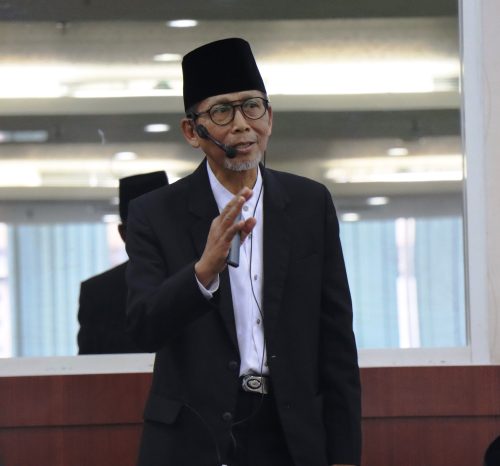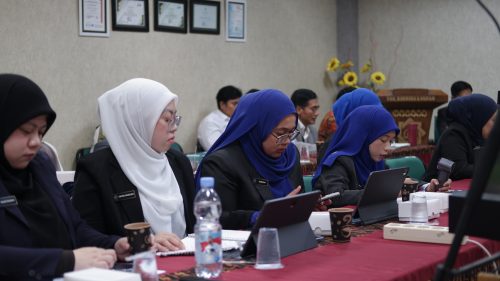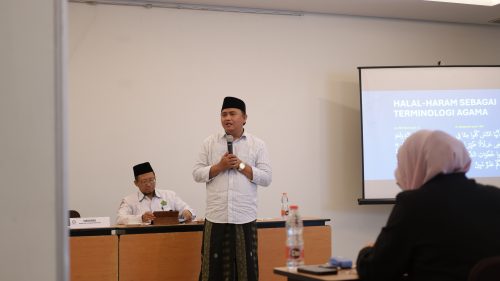The opening verse, “Bismillah al-Rahman al-Rahim,” implies a broad meaning and is completely important in the life of a Muslim. As a verse that always precedes every human activity, “basmalah” encompasses a deep spiritual dimension. Linguistically, each word carries the burden of Allah’s mercy and compassion, emphasizing His attributes of the Most Gracious and the Most Merciful. While, the spiritual dimension of basmalah emphasizes the totality of human dependence on Him in every action and decision making. In addition, basmalah also reflects the aspect of opening the door to Allah’s mercy, success, and protection which is constantly present in our everyday life.
The interpretation of basmalah brings an inspiring message and provides a positive moral foundation to deal with and live life. More than just a linguistic analysis, this interpretation is not intended to create a pessimistic atmosphere, but rather, it is a motivation for humans to lead a life with optimism. How can it not be, in basmalah, we find a reflection of Allah’s optimistic nature which contains His unlimited power. This interpretation gives suggestion that Allah, with His knowledge and wisdom, is able to realize every human’s desire and hope. So, understanding basmalah not only functions as a spiritual guide, but also as a source of positive spirit that invites humans to believe in their own abilities and in the power of Allah who opens the doors of hope in every step of life’s journey.
The interpretation of basmalah in this short article starts from the meaning of the letter Ba’ which begins to become the opening of the first verse. The first meaning of the letter Ba’ in verse basmalah is lil ilshaaq “to attach oneself” or “to be closely connected” to Allah. In this context, the letter Ba’ becomes a symbol of the deep spiritual relationship between humans and The Creator. By mentioning the name of Allah at the beginning of every activity through basmalah, a person shows his desire to create an inner bond with Allah in every aspect of life. Lil ilshaaq illustrates the awareness of absolute dependence on Allah, asking for His guidance, and hoping for His presence in every step of life.
Verse 40, chapter al-Taubah describes how Prophet Muhammad comforted Abu Bakr who was afraid of being harmed by a group of pursuing pagans. The Prophet reassured him by saying “laa tahzan inna Allah ma’ana” (do not grieve, indeed Allah is with us). At that moment, the Prophet was performing a process of ilshaaq (attachment) to Allah’s power. A spectacular event then unfolded. Allah involved Himself in their affairs “fa anzala Allah sakiinatahu ‘alaih” (so Allah sent down His tranquility upon him). Not only that, as the process of ilshaaq grew stronger, Allah further involved Himself by increasing His help for them with “wa ayyadahu bi junuudi lam tarauha” (and Allah also sent soldiers from among the angels) to protect them.
The second meaning of the letter Ba’ in verse basmalah is lil isti’aanah (seeking help) from Allah. The letter Ba’ becomes the gateway to prayer and a deep longing to receive His help and guidance in every step of life. By mentioning His name to begin activities, humans express their complete dependence and attachment to The Creator, affirming that all their efforts and achievements are not separate from His help and blessings. Lil isti’aanah in basmalah hones human sensitivity to feel spiritual strength and full trust in Allah as the source of infinite wisdom and power. In al-Qur’an, chapter al-Ghafir verse 60, Allah Himself recommends that we always seek His help “ud’uunii astajiblakum” (call upon Me, I will respond to you).
The third meaning of the letter Ba’ in verse basmalah is “lissababiyyah” (causality). Allah is the cause of everything that has existed, exists, and will exist. “bii yakuunu maa yakuunu wa bii kaana maa kaana” (I am the cause of what will be and what has been). In this context, the letter Ba’ becomes the gateway to understand that every event and creation in this world stems from the will and power of Allah. By mentioning the name of Allah at the beginning of every activity through basmalah, humans acknowledge that Allah is the source of all creations and existences, and it reflects an attitude of tawakal (trust) and devotion to Him. The principle of lissababiyyah invites humans to view every event in life as part of His wise plan.
The next word is “Allah”. By reciting the name “Allah” in basmalah, we are presented with the fundamental teaching of tawhid rububiyyah (oneness of Lordship). This word reflects the acknowledgment and belief in the oneness and absolute power of Allah as The Creator, Provider, and Ruler of everything in the universe. The concept of tawhid rububiyyah teaches that Allah is the only one who has full authority over the creations and management of all His creations. By mentioning the name of Allah at the beginning of every activity through basmalah, humans implicitly acknowledge and internalize the existence of Allah as the One God. As the opening of every chapter in al-Qur’an (except Surah al-Taubah), basmalah, with the word “Allah”, instills the principle of tawhid rububiyyah as the most vital pillar in Islam.
No less interesting than the vast meanings of Ba’’ and tawhid rububiyyah above, basmalah is closed with the two most special names of Allah, al-Rahman and al-Rahim (the Most Gracious and the Most Merciful). Allah has 99 most beautiful names, but why are these two the ones He chose to begin His revelation and all human activities? With these two names, it is as if He wants to show humanity and the entire universe that even though He is All-Powerful, All-Compelling, All-Tormenting, All-Scheming, All-Repaying, and so on, all these names and attributes are overcome by His two attributes of “Most Gracious” and “Most Merciful”. These two names are also repeated in the second verse of chapter al-Fatihah “al-rahman al-rahiim”. This repetition shows how great Allah’s mercy is towards His creation, as the Prophet said “inna rahmatii taghlibu ghadhabii” (indeed, My mercy overcomes My wrath) (Narrated by Muslim). So the best seduction for Allah in our prayers is to end the prayer by mentioning these two names (bi rahmatika yaa arhamar raahimiin).
Dr. Sanuri, S.Ag., M.Fil.I., The Head of the Study Program of Ilmu al-Qur’an & Tafsir, Doctoral Program, UIN Sunan Ampel Surabaya.
















